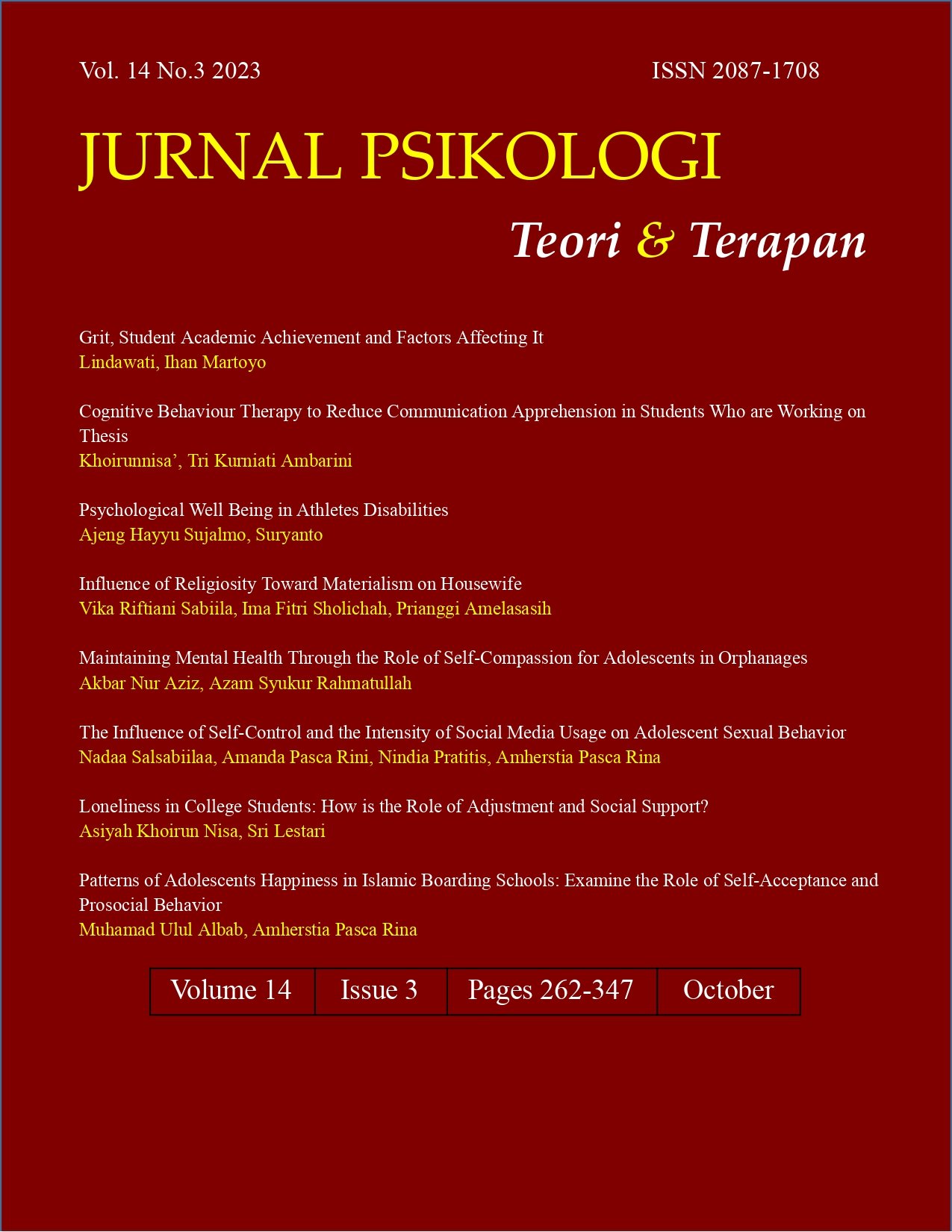Maintaining Mental Health through the Role of Self-Compassion for Adolescents in Orphanages
DOI:
https://doi.org/10.26740/jptt.v14n03.p300-310Keywords:
Self-Compassion, Mental Health, Adolescents, Orphanages, Kesehatan mental, Remaja, Welas asih, Panti asuhanAbstract
The purpose of this study was to analyze the role of Self-Compassion on adolescent mental health in orphanages and analyze the causative factors and ways to overcome mental health disorders for adolescents in orphanages. The research method uses a mix method. Study 1 is quantitative data obtained from filling out questionnaires with a Likert scale with 43 samples aged 12-18 years. Quantitative data analysis using multiple linear regression. Study 2 is qualitative data obtained by conducting interviews, observations at the orphanage Minggir area, Sleman Special Region of Yogyakarta. Qualitative data analysis uses reduction techniques, display and conclusion drawing, as well. The results showed that: Study 1, there was an effect of Self-Compassion of 21.9% on the mental health of orphanage adolescents. The other 78.1% are other influences such as parenting, environment, self-openness, education, and so on. Study 2, Factors causing mental health disorders of orphanage adolescents include the background of adolescents from families of victims of domestic violence, victims of pornographic action and parenting that is not optimal. The implication of this study is that to improve mental health, it is necessary to instill a consistent self-compassion attitude for orphanage adolescents.
ABSTRAK
Tujuan penelitian ini adalah untuk menganalisis peran Self-Compassion terhadap kesehatan mental remaja di panti asuhan dan menganalisis faktor penyebab serta cara menanggulangi gangguan kesehatan mental bagi remaja di panti asuhan. Metode penelitian menggunakan mix method. Study 1 yakni data kuantitatif diperoleh dari pengisian kuesioner dengan skala likert dengan 43 sampel usia 12-18 tahun. analisis data kuantitatif menggunakan regresi linear berganda. Study 2 yakni data kualitatif diperoleh dengan melakukan wawancara, observasi di panti asuhan daerah Minggir, Sleman Daerah Istimewa Yogyakarta. Analisis data kualitatif menggunakan teknik reduksi, display dan penarikan kesimpulan, serta. Hasil penelitian menunjukkan bahwa: Study 1, terdapat pengaruh Self-Compassion sebesar 21.9% terhadap kesehatan mental remaja panti asuhan. 78.1% lainnya merupakan pengaruh lain seperti pola asuh, lingkungan, keterbukaan diri, pendidikan, dan sebagainya. Study 2, Faktor penyebab gangguan kesehatan mental remaja panti asuhan di antara lain ialah latar belakang remaja dari keluarga korban KDRT, korban porno aksi dan parenting yang tidak maksimal. Implikasi penelitian ini adalah guna meningkatkan kesehatan mental diperlukan penanaman sikap self-compassion yang konsisten bagi remaja panti asuhan.
References
Arini, M. (2018). Memilih Desain Penelitian Mixed-Methods. Umy.Ac.Id. http://merita.staff.umy.ac.id/2018/04/21/memilih-desain-penelitian-mixed-methods/
Daulay, F. (2021). Motif Anak Panti Asuhan di Malang Dibully Usai Diperkosa, Korban Begitu Terpukul. Indozone.Id. https://www.indozone.id/news/L9s8Qo7/motif-anak-panti-asuhan-di-malang-dibully-usai-diperkosa-korban-begitu-terpukul/read-all
Desmana, R. C. (2022). Ladung, Kesehatan Mental Remaja Korban Kekerasan Verbal di Desa Lubuk Ladung Kecamatan Kedurang Ilir Kabupaten Bengkulu Selatan [UIN Fatmawati Sukarno Bengkulu]. http://repository.iainbengkulu.ac.id/8947/
Harahap, E., Sukatno, S., & Warzuqni, A. (2021). Kesehatan Mental Remaja Putri Korban Perceraian Orang Tua. Ristekdik : Jurnal Bimbingan Dan Konseling, 6(2), 268. https://doi.org/10.31604/ristekdik.2021.v6i2.268-272
Jahja, Y. (2011). Psikologi perkembangan (1 (ed.)). Kencana. https://books.google.co.id/books?hl=id&lr=&id=5KRPDwAAQBAJ&oi=fnd&pg=PA3&dq=fase+perkembangan+manusia+dalam+psikologi&ots=DYBCQwKC0N&sig=bL7GbS4orFqPWDwgm0C7Xz0f8xE&redir_esc=y#v=onepage&q=fase perkembangan manusia dalam psikologi&f=false
Omari, F., Chrysanthopoulou, S. A., Embleton, L. E., Atwoli, L., Ayuku, D. O., Sang, E., & Braitstein, P. (2021). The impact of care environment on the mental health of orphaned, separated and street-connected children and adolescents in western Kenya: A prospective cohort analysis. BMJ Global Health, 6(3). https://doi.org/10.1136/bmjgh-2020-003644
Palupi, P. A. (2022). Videonya Sempat Viral, Korban Pelecehan Seksual di Nol Kilometer Laporkan Pelaku ke Polresta Yogyakarta. Suarajogja.Id. https://jogja.suara.com/read/2022/07/07/171526/videonya-sempat-viral-korban-pelecehan-seksual-di-nol-kilometer-laporkan-pelaku-ke-polresta-yogyakarta
Pietrangelo, A. (2019). What You Should Now About Cutting. Healthline.Com. https://www.healthline.com/health/cutting
Setiawan, K. (2021). Kemensos Berikan Perlindungan kepada 4 Jutaan Anak Yatim-Piatu. Kementrian Sosisal Republik Indonesia. https://kemensos.go.id/kemensos-berikan-perlindungan-kepada-4-jutaan-anak-yatim-piatu
Vharensie, A. (2021). Konsep Pendidikan Remaja untuk Menanamkan Akhlak dalam Perspektif Islam [UIN Raden Intan Lampung]. http://repository.radenintan.ac.id/15971/
Wibowo, D. A., & Zen, D. N. (2020). Pentingnya Pengetahuan Masyarakat Tentang Kesehatan Jiwa Di Dusun Cimamut Kabupaten Ciamis. Abdimas Galuh, 2(1), 65. https://doi.org/10.25157/ag.v2i1.3344
Windu, G. A. (2021, December). Kesehatan Mental bagi Anak-anak Panti Asuhan Taqwa Al-Qolbi. Kompasiana.Com. https://www.kompasiana.com/gheaardywindututunineke6071/61c5ac319bdc4054f342bf63/kesehatan-mental-bagi-anak-anak-panti-asuhan-taqwa-al-qolbi
Yulianingsih, D. (2020). Kesehatan Mental Remaja pada Komunitas Broken Home di Kota Semarang [Universitas Muhammadiyah Semarang]. http://repository.unimus.ac.id/4371/
Downloads
Published
How to Cite
Issue
Section
License

This work is licensed under a Creative Commons Attribution-NonCommercial 4.0 International License.
Authors who publish in this journal agree to the following terms:
Copyright in any article is held by the author.
The author grants the journal, publication rights with the work simultaneously licensed under a Creative Commons Attribution License that allows others to share the work with an acknowledgment of the work's authorship and initial publication in this journal.
Authors may enter into separate, additional contractual arrangements for the non-exclusive distribution of the journal's published version of the work (e.g., posting it to an institutional repository or publishing it in a book), with an acknowledgment of its initial publication in this journal.
Authors are permitted and encouraged to post their work online (e.g., in an institutional repository or on their website) prior to and during the submission process, as this can lead to productive exchanges, as well as earlier and greater citation of published work.
 Abstract views: 1018
,
Abstract views: 1018
, PDF Downloads: 703
PDF Downloads: 703


















